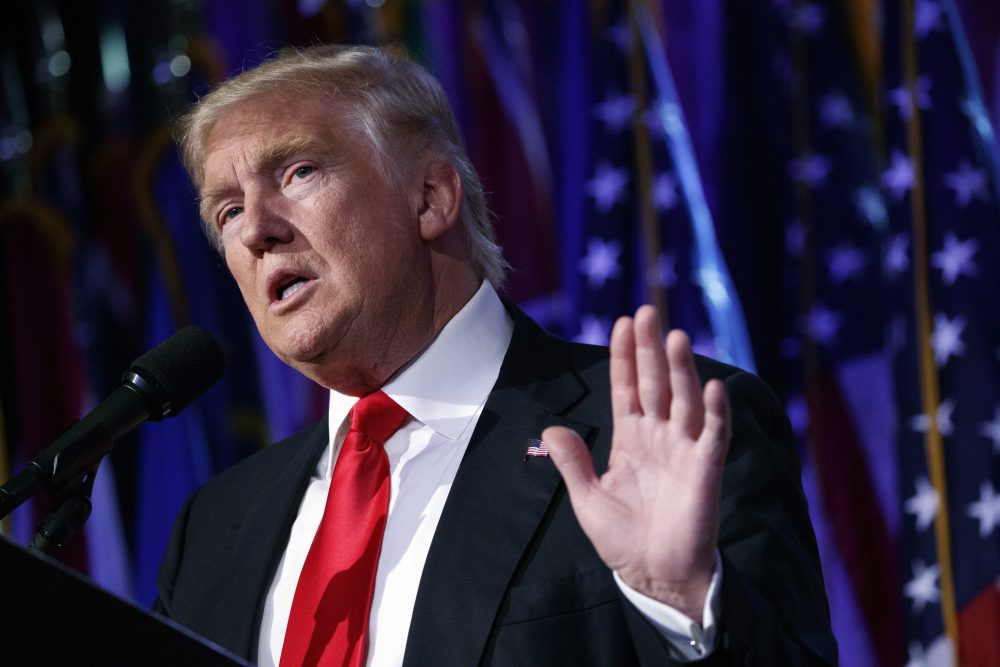Advertisement
Here Are The Policies Even Trump's Fiercest Critics Can — And Should — Get Behind

COMMENTARY
With reports that Donald Trump might give a Cabinet job to Chris Christie, even Hillary Clinton’s voters can agree Christie would be a great pick for transportation secretary. Wouldn’t it be fun to see some New Jersey-style traffic jams in Trump’s Washington?
OK, no more Bridgegate jokes. But the idea that we who voted against Trump might be able to support some of the president-elect’s initiatives is serious. After all, he’s going to be president for the next four years, rioting by disgruntled citizens notwithstanding.
More importantly, as rancid as his campaign was — we’ll get to why his presidency could bring nighttime in America shortly — Trump’s agenda for his first 100 days in office, laid out last month, offers three points to which the loyal opposition should agree.
First, “a 5-year ban on White House and Congressional officials becoming lobbyists after they leave government service,” coupled with “a lifetime ban on White House officials lobbying on behalf of a foreign government.”
Trump’s agenda for his first 100 days in office, laid out last month, offers three points to which the loyal opposition should agree.
The revolving door between government and special interests, allowing ex-officials to peddle influence on the latter’s behalf, is a tumor on the body politic, uniting reformers across the political spectrum. Bill Clinton imposed a five-year lobbying ban on his White House, regrettably rescinded near the end of his tenure. Barack Obama’s effort to jam the revolving door failed, showing both the difficulty and the urgency of helping Trump’s promise stick.
Second, “leverag[ing] public-private partnerships, and private investments through tax incentives, to spur $1 trillion in infrastructure investment over 10 years.”
Yes, the financing is fuzzy. (Mucking up the labyrinthine tax code even more with “incentives”?) But fixing our roads, bridges, ports and airports, and utilities was a rare area of agreement between Trump and Clinton, and it’s critically necessary.
Third, I omit direct quotation here because most of the specifics aren't great, but in essence, continue efforts to curb illegal immigration.
In his speech, Trump blustered about a Mexican-financed border wall, but as even knowledgeable conservatives note, it would be ludicrously expensive, and Mexico says it’s preposterous to think it will pick up the tab. The wall, his anti-Mexican rhetoric, and his proposed ban on Muslim entrants branded Trump a xenophobe; Massachusetts Congressman Mike Capuano believes the Muslim ban wouldn’t survive a court challenge.
Still, pro-immigration liberals from Capuano to President Obama agree that there are sensible ways to tighten the border, both to uphold the law and to keep faith with immigrants who go through all the legal hoops to enter America.
There’s a fourth idea, excluded from Trump’s speech, that deserves support: getting NATO allies to pay more for their own defense after decades of foot-dragging. Not by abruptly taking our football and going home, as the president-elect seemed to suggest in the campaign, but by the gradual, clearly communicated approach laid out by scholar and former Army Col. Andrew Bacevich: Turn the usually American NATO command over to a European, then shutter key U.S. military headquarters in Europe, then set a date for repatriating American troops.
These four ideas are sensible public policy. The nation should seize them, as “sensible” could be in short supply during a Trump presidency, judging from his 100-day agenda.
Trump-onomics would hurt the very people he says he wants to help. Deregulation and tax cuts skewed to the wealthy? George W. Bush tried that; had it worked, we wouldn’t be having this conversation.
Repealing Obamacare? Neither Trump nor his party has yet proposed a replacement that would cover anything near the 20 million who’d lose insurance.
Perhaps the olive branch of supporting him when he’s right will encourage Trump to back off those areas where his thinking has gone off the rails.
Protectionism? Economists warn that would endanger millions of export-dependent jobs.
His promise to rev fossil fuel production and cancel contributions to U.N. programs against climate change, which Trump has called a hoax, would coddle the tinfoil-hat set and delay the inevitable. (Besides, curbing climate change won’t be an economy-killer.)
Oh, and did I mention the xenophobia?
Perhaps the olive branch of supporting him when he’s right will encourage Trump to back off those areas where his thinking has gone off the rails. On the other hand, nothing in his campaign suggested he’s the unifying, kumbaya type. Going forward, prudence dictates that Trump skeptics tweak Theodore Roosevelt’s dictum: Speak compromisingly, but carry a big filibuster and court challenge.
